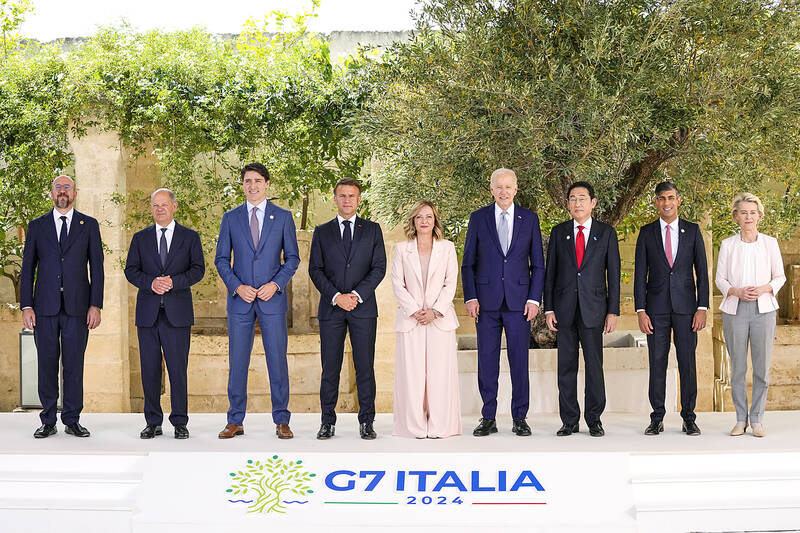Leaders of the G7 nations on Friday reiterated the importance of stability and peace in the Taiwan Strait, while expressing support for Taiwan’s participation in international organizations.
“We reaffirm that maintaining peace and stability across the Taiwan Strait is indispensable to international security and prosperity. We support Taiwan’s meaningful participation in international organizations, including in the World Health Assembly and WHO technical meetings, as a member where statehood is not a prerequisite and as an observer or guest where it is,” the leaders said in an end-of-summit statement in Italy.
“There is no change in the basic positions of the G7 members on Taiwan, including stated one China policies,” the statement said, while calling for “a peaceful resolution of cross-strait issues.”

Photo: AP
President William Lai (賴清德) yesterday thanked the G7 leaders in a message on X.
“Heartfelt thanks to the leaders of the #G7 for reaffirming the importance of peace & stability in the Taiwan Strait and for supporting #Taiwan’s int’l participation,” Lai wrote.
“As a responsible global stakeholder, Taiwan will continue to safeguard the status quo & our hard-won democracy,” he added.
The Presidential Office also thanked the G7 leaders for their support for peace in the Strait and Taiwan’s participation in international bodies, office spokeswoman Kuo Ya-hui (郭雅慧) said.
Taiwan is a responsible member of the international community and in the Asia-Pacific region, and would continue to work with like-minded nations to uphold democracy, freedom, the rule of law and human rights, despite Chinese military threats and efforts to strangle Taiwan economically and politically, Kuo said.
In a separate statement, the Ministry of Foreign Affairs also said that Taiwan would continue to work with G7 members and other like-minded countries to uphold the rules-based international order and maintain peace and stability in the Asia-Pacific region and worldwide.
In the end-of-summit statement, the leaders of the G7 nations — Canada, France, Germany, Italy, Japan, the UK and the US — said they were seriously concerned about the situation in the East and South China seas, adding that they have “strong opposition to any unilateral attempt to change the status quo by force or coercion.”
“We continue opposing China’s dangerous use of coast guard and maritime militia in the South China Sea and its repeated obstruction of countries’ high-seas freedom of navigation,” it said.
They also said they remain concerned about the human rights situation in China, including the use of forced labor in Tibet and Xinjiang.
“We are also worried by China’s crackdown on Hong Kong’s autonomy, independent institutions, and civil society and continued erosion of rights and freedom, including through the recent enactment of legislation under Article 23 of the Basic Law that has broad and vaguely defined provisions regarding ‘sedition,’ ‘state secrets’ and interactions with foreign entities,” it said. “We express concerns about the use of such laws to silence dissent in Hong Kong and overseas, including politically motivated prosecutions.”
Regarding Russia’s invasion of Ukraine, the G7 leaders called on China “to press Russia to stop its military aggression and immediately, completely and unconditionally withdraw its troops from Ukraine,” as well as “to cease the transfer of dual-use materials, including weapons components and equipment, that are inputs for Russia’s defense sector.”

SECURITY: As China is ‘reshaping’ Hong Kong’s population, Taiwan must raise the eligibility threshold for applications from Hong Kongers, Chiu Chui-cheng said When Hong Kong and Macau citizens apply for residency in Taiwan, it would be under a new category that includes a “national security observation period,” Mainland Affairs Council (MAC) Minister Chiu Chui-cheng (邱垂正) said yesterday. President William Lai (賴清德) on March 13 announced 17 strategies to counter China’s aggression toward Taiwan, including incorporating national security considerations into the review process for residency applications from Hong Kong and Macau citizens. The situation in Hong Kong is constantly changing, Chiu said to media yesterday on the sidelines of the Taipei Technology Run hosted by the Taipei Neihu Technology Park Development Association. With

CARROT AND STICK: While unrelenting in its military threats, China attracted nearly 40,000 Taiwanese to over 400 business events last year Nearly 40,000 Taiwanese last year joined industry events in China, such as conferences and trade fairs, supported by the Chinese government, a study showed yesterday, as Beijing ramps up a charm offensive toward Taipei alongside military pressure. China has long taken a carrot-and-stick approach to Taiwan, threatening it with the prospect of military action while reaching out to those it believes are amenable to Beijing’s point of view. Taiwanese security officials are wary of what they see as Beijing’s influence campaigns to sway public opinion after Taipei and Beijing gradually resumed travel links halted by the COVID-19 pandemic, but the scale of

A US Marine Corps regiment equipped with Naval Strike Missiles (NSM) is set to participate in the upcoming Balikatan 25 exercise in the Luzon Strait, marking the system’s first-ever deployment in the Philippines. US and Philippine officials have separately confirmed that the Navy Marine Expeditionary Ship Interdiction System (NMESIS) — the mobile launch platform for the Naval Strike Missile — would take part in the joint exercise. The missiles are being deployed to “a strategic first island chain chokepoint” in the waters between Taiwan proper and the Philippines, US-based Naval News reported. “The Luzon Strait and Bashi Channel represent a critical access

Pope Francis is be laid to rest on Saturday after lying in state for three days in St Peter’s Basilica, where the faithful are expected to flock to pay their respects to history’s first Latin American pontiff. The cardinals met yesterday in the Vatican’s synod hall to chart the next steps before a conclave begins to choose Francis’ successor, as condolences poured in from around the world. According to current norms, the conclave must begin between May 5 and 10. The cardinals set the funeral for Saturday at 10am in St Peter’s Square, to be celebrated by the dean of the College